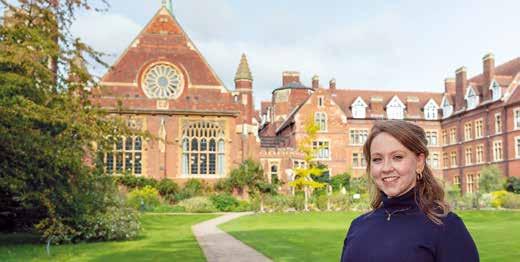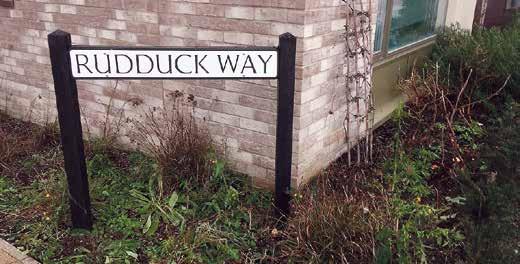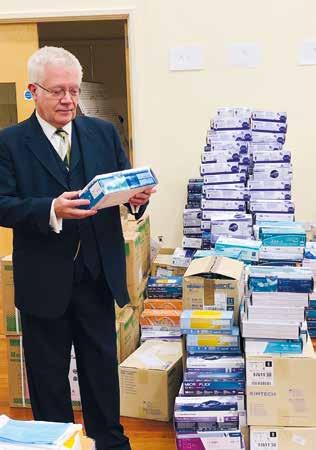
12 minute read
2020 News Highlights
Liz Osman
From lunchboxes to foodbanks
Advertisement
Alumna Lorraine Schulze (née Wicker) (BEd 1985) explains how her Homerton training and 30 years in teaching equipped her to manage foodbank provision as demand soared during the pandemic.
I was at Homerton from 1985–89 and it was an amazing and inspiring time, full of fun, friendship and vibrant learning experiences. It was in the days when everyone at Homerton was training to teach and we had that common bond. My main subject was Religious Studies and I especially enjoyed studying theology with other university students.
I went on to teach in Kent, London and Medway for the next 30 years, teaching the whole age range from Nursery to Year 6 and specialising at times in music and then special needs. I spent the last 14 years as a SENCO, for most of that time working with a fantastic team in a Catholic primary school in a deprived area of Medway. I also worked on safeguarding issues for many of those years.
When a particularly inspirational head teacher that I worked closely with retired, I decided to take a mini career break. After some part-time SENCO posts in tiny schools in Kent villages, I took a big career change step and took on the role of Project Manager for Medway Foodbank. I had been a voucher distributor for the foodbank in my role as SENCO and was well aware of the levels of poverty for many local people. As a volunteer at the foodbank in the church that I attended, I had already seen the foodbank operation from two different angles.
That was in 2018 and in that year the eight foodbank centres in Medway fed around 5,800 people. This year of 2020, as for all of us, has been somewhat different and challenging. We closed the foodbank centres during the first lockdown and haven’t opened them since. We reworked our whole operation quickly into a delivery only service and we are currently delivering around 100 parcels a week to those in need. Medway is currently in Tier 3 with our rates sadly being the highest in the country as I write in December.
So far this year we have fed over 10,600 people, of which just over 5,000 were children. We are part of the UK-wide Trussell Trust network of foodbanks so we work with a voucher system. We have 150+ voucher distributor agencies including schools, Children and Family Hubs and local charity groups that support families. The aim is that, as well as receiving food, people also receive signposting support and advice to help them out of their financial crisis.
From my days as a SENCO and safeguarding lead I know only too well the complexities of life for those experiencing poverty as well as the need for clear advice to help families make steps towards a better future.
I have learnt that my skills from 30 years of teaching are certainly transferrable, and this year I have certainly called upon some of the resilience that I developed through working in a school in a challenging area.
All eyes on Beth
In June, Junior Research Fellow in Artificial Intelligence Dr Beth Singler was named a 21toWatch award winner by communications consultancy Cofinitive, at an event which celebrated the people and companies setting the standard in innovation and entrepreneurship.
Cofinitive founder Faye Holland said:“What all our winners have in common is something that has the potential for huge impact on a personal, company or product basis.”
After reading Theology and Religious Studies as an undergraduate at Pembroke, Beth spent eight years working as a screenwriter, during which time she also acquired a Postgraduate Diploma in Script Development at the National Film and Television School.
She made the move back to academia in 2010, returning to Pembroke for a Masters, in which she developed a growing interest in the anthropology of religion, and how theistic elements find their way into such unlikely areas as pro-anorexia websites. Her PhD explored the formation of identity through online platforms, looking at how technology shapes people’s worldview, and as a post-doc she established an increasing expertise in Artificial Intelligence from an anthropological perspective.
After a research project at the Faraday Institute for Science and Religion, where she explored questions of human identity in relation to developments in AI, Beth joined Homerton in 2018. She is in international demand as a speaker and conference contributor, has lectured at the Faculty of Divinity and, through her active Twitter presence, provides an engaging and accessible voice on an aspect of contemporary life which many perceive as threatening.
“The conversation around AI is moving so quickly, that there’s something very exciting about trying to keep up with both technological developments and people’s understanding of them,” she says. “Online cultures are constantly developing, so it’s almost like working in a lab – you’re seeing things happen in real time.”
Having harnessed the skill-set of her previous career to make a series of short films about AI, Beth is rapidly making a name for herself as the go-to person for public engagement around the subject.
“Science Fiction gives the impression that the future is set. I think it’s important to remind people that we do have agency. We can say no.”
Beth accepts her award in an online ceremony
The College was hugely excited, in August 2020, to appoint Oxford-based poet Mariah Whelan as its inaugural Poet-in-Residence, a role which is believed to be a first for any Cambridge college.
The position is generously funded by Dr Norman Bardsley, in memory of his wife, Jacqueline, who attended Homerton from 1960–62. Mrs Bardsley, who died last year, was a lifelong writer and lover of poetry, and was actively involved in several poetry societies near her home in California.
“Homerton has a long tradition of stimulating creativity and encouraging students to develop knowledge and skills that go well beyond their major academic studies,” says Dr Bardsley. “My family and I hope that the Poet-in-Residence programme will help to develop greater participation in the arts by future students and alumni.”
The introduction of a Poet-in-Residence is intended to enable Homerton to foster a culture of poetry among its students and alumni, an ambition which correlates directly with Mariah’s previous experience. Having recently completed her PhD at the University of Manchester, and the author of two published collections of poetry, she is also the former Director of the Oxford Writer’s House, which brings diverse communities together through writing. Mariah is a member of Truth Tellers, an interdisciplinary collective that brings together Arts and International Relations methodologies to explore questions of identity in contemporary Britain.
“The thing about bringing people together to write poetry is that most people don’t do it professionally or in an academic context, so it’s a wonderful playground,” she says.
The Principal, Professor Geoff Ward, said: “I am delighted to welcome Mariah Whelan as the first Poet-in-Residence at Homerton College. Not only does Mariah have an excellent reputation as a published poet, but also brilliant ideas for building a poetic community here, even under the tough conditions brought about by the pandemic. Poetry is quite rightly experiencing a revival of interest during these troubled times, when people are looking not only for solace but for new ideas. Mariah Whelan’s poetry is full of the new, but will appeal to all, and I am delighted to welcome her on behalf of Homerton College.”
Photograph by David Johnson
Poet-in-Residence Mariah Whelan

Mariah plans a threefold approach: writing new poetry for the College in collaboration with students and staff, teaching and bringing in contemporary poets to give readings, and conducting research.
She made her first public appearance for Homerton at the online Alumni Reunion Weekend at the end of September. Alumni joined Mariah via Zoom to discuss their own favourite poems and listen to Mariah’s own work and thoughts in the context of Poetry and Connection.
She has since conducted two virtual residencies for students, in one of which she made enthusiastic use of her findings from the Homerton archive, and regularly stages a takeover of the College’s social media in order to share her interactive approach to creating new work.
“Poetry gives people new ways of thinking about the world,” she says. “It’s not a decoration on top of life, but fundamental to the way I live my life.”
Supporting refugees in Greece
Second-year student Jacob Gawel (Natural Sciences 2019) took full advantage of the relaxing of travel bans over the summer, taking up a spontaneous opportunity to travel to a Greek island. Tempting as that might sound, this was no holiday, but a monthlong volunteering stint, working with Syrian refugees on the island of Chios.
“I got a message from a friend saying that someone else had dropped out and did I want to go to Greece to help refugees for a month. A few weeks later I was on a plane.”
Now run as a German NGO Offene Arme (Open Arms), the project Jacob worked with began in 2015 when Chios hotelier Toula Kitromilidi turned over her hotel to accommodate refugees who were arriving on the island with nothing.
“Chios is one of the closest islands to Turkey – you can actually seeTurkey from the east coast, and boatloads of people cross that stretch of water every day.”
Refugees are now housed in a camp, but volunteers like Jacob are needed to run a clothing warehouse which provides them with essentials. Stocked with donations from all over Europe, the warehouse operates as a cashless shop, providing each person with set number of free items.
“We had to restock the shop with winter items for the change of season, help people to find suitable clothes, and check their documents to make sure they weren’t receiving more than they were entitled to. It’s awkward, as obviously you don’t want to deny people something when they have so little, but clothes are currency in the camp, so we have to stick to the system to ensure it’s fair.”
Under normal circumstances, volunteers would also visit the camp itself to run activities such as language classes or children’s sports, but it was closed under Covid restrictions. Instead, Jacob visited refugees who were housed separately from the camp because they were perceived to be vulnerable, playing cards and providing muchneeded human interaction.
“Talking to local people, you get an immediate sense of the tension between them and the NGOs. Although there were no boat landings while we were there, 250 people arrived in a single day just after we left, and there’s been lots of conflict. One of the clothing warehouses has previously been burned down by locals – it’s quite a volatile situation.”
Jacob received a £300 grant from Homerton towards his expenses, which helped him to cover travel costs, a Covid-19 test and his accommodation at Toula’s hotel.
“When you’re in a room full of people from all over the world, all fleeing from something and all of their lives in limbo, it’s quite overwhelming, but rewarding to be able to do something to help.”
Eddington street honours Homerton Fellow
Homerton is delighted that one of its former Fellows, Jean Rudduck, has been immortalised by having a road named after her in Eddington, the new residential development in North West Cambridge. Fittingly, Rudduck Way is opposite the pioneering University of Cambridge Primary School, in whose creation several members of the College played key roles.
Jean Rudduck died of ovarian cancer in 2007 aged 70. She was well known for championing the potential of ‘pupil voice’ as a means of achieving school improvement and changes to teaching and learning. Her ideas were taken up both across the UK and further afield.
Jean was Joint Director of Research at Homerton during the 1990s and made major contributions by building the College’s reputation as an international centre for research and innovation. She also played an important role in helping to create the vision for the new Faculty of Education in 2001. She was made a Professorial and Foundation Fellow in 2001, and appointed Professor of Education by the University.
When, several years ago, the University asked for suggested names for Eddington’s streets and roads, it received over 50 nominations including Nobel prize-winners, scientists, poets and playwrights. During a second round these suggestions were whittled down to the Nobel laureates, features of the landscape and nine people nominated by the local community. These included the biblical scholar Miles Burkitt, the physicist Sir Arthur Eddington, Dorothy Garrod, the University’s first female professor in Archaeology, and Alan Turing, the pioneering computer scientist.
Having reached the final round, Rudduck Way provides a permanent record of Jean’s outstanding contribution among those honoured on the new site.
Jean is the second person associated with Homerton in recent times to have had a road named after them. Harrison Drive, which runs between the College and the Faculty of Education, pays tribute to the leadership provided by Sir David Harrison, chair of Homerton’s trustees.

How Homerton became a key distributor of PPE
As the University closed down its usual functions in mid-March, and hospitals prepared for a potential influx of Covid patients, Homerton swapped students for scrubs, becoming the site of an impressive PPE distribution point.
While our proximity to Addenbrooke’s Hospital meant that we were ideally placed to offer support, it wasn’t initially clear what form this might take.
“At first, it was thought that Addenbrooke’s might be overwhelmed, so we offered to provide accommodation to any healthcare professionals who might need to be near to the hospital,” explains the Principal, Professor Geoff Ward. “In the event that wasn’t necessary, but instead we were able to offer space to store personal protective equipment (PPE) for use at the hospital and in other settings.”
Cambridge University departments, including the School of Biological Sciences, the Cambridge The Principal with some of the supplies of PPE Institute for Medical Research, and the departments of Zoology, Pharmacology and Chemistry donated face “From the start, and throughout, Homerton masks, visors, gowns, goggles, antibacterial wipes have been fantastic,” says the Pro-Vice and hazmat suits. Donations also flooded in from Chancellor for Enterprise and Business Relations, around the world through alumni connections and Professor Andy Neely. “The speed with which University partners, allowing a central logistics hub the facility was set up was in no small part to be formed at Homerton. due to Homerton’s generous offer to provide
The auditorium in the Mary Allan Building, used space for the PPE donations. This also enabled in normal times for lectures and concerts, became Addenbrooke’s to store additional PPE that they a warehouse, packed with towers of boxes. Medical had purchased when their storage facility was grade equipment was supplied to the hospital, while at capacity. This was invaluable to the hospital, PPE was also issued via the Homerton site to care and I know they are greatly appreciative of the homes, GP practices and other healthcare sites. College in providing this facility.”











